Critical Reflection 2: Leadership, Ethics, and Cross-Cultural Issues
VerifiedAdded on 2021/12/17
|7
|1871
|73
Journal and Reflective Writing
AI Summary
This critical reflection, submitted by a student, analyzes leadership within a global context, drawing upon seminar experiences, course materials, and external sources like Forbes and The Guardian. The reflection covers leadership styles, ethical decision-making processes, and the challenges of cross-cultural leadership. The author identifies the importance of emotional intelligence, cultural awareness, and inclusive leadership in managing diverse teams and navigating ethical dilemmas in international business. The paper explores the GLOBE project and its impact on understanding cross-cultural leadership, as well as various ethical perspectives and frameworks. The student reflects on how these insights have influenced their understanding of leadership, ethical considerations, and the importance of corporate social responsibility in a globalized world. References to articles from Forbes, Csrwire.com, and The Guardian further support the analysis.
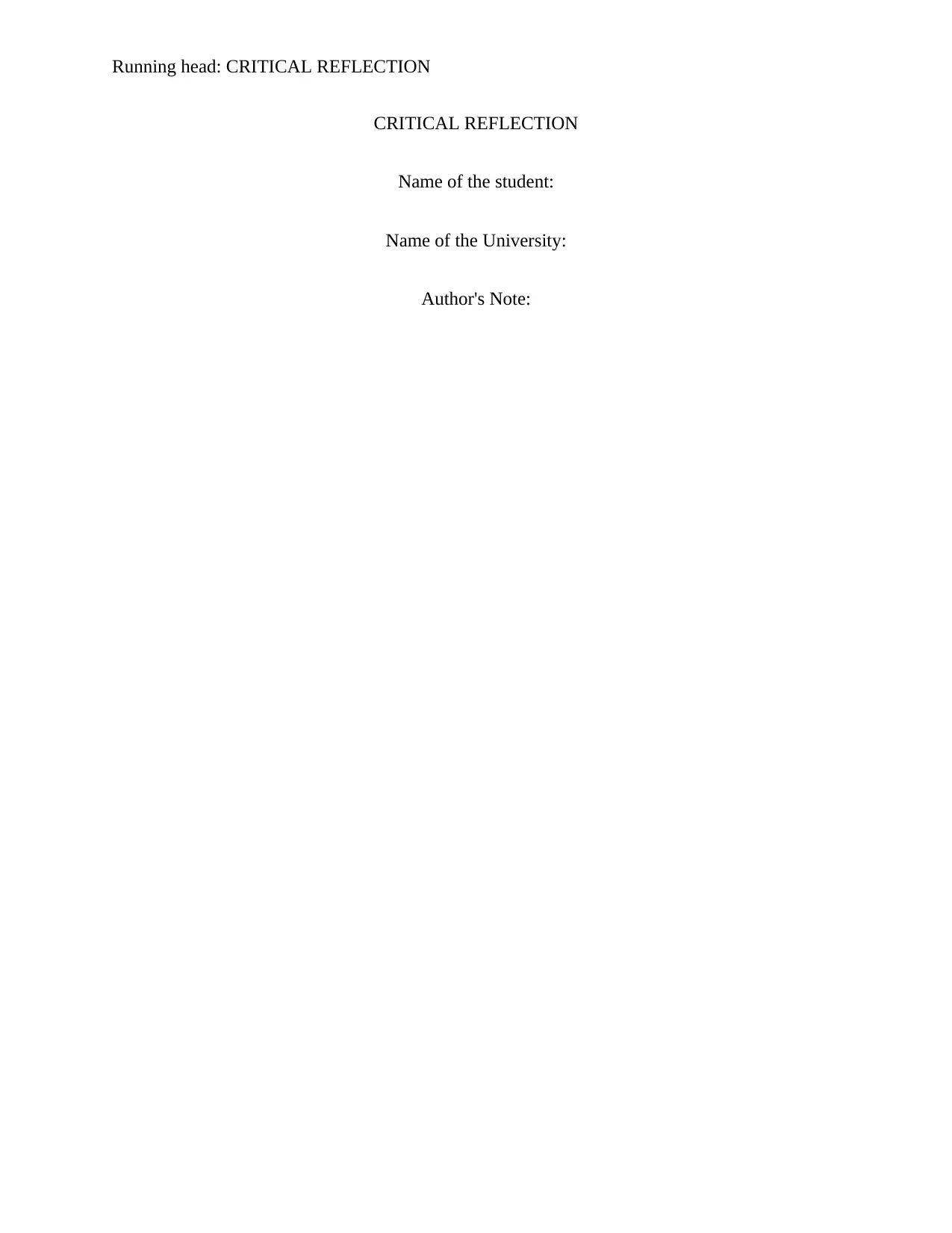
Running head: CRITICAL REFLECTION
CRITICAL REFLECTION
Name of the student:
Name of the University:
Author's Note:
CRITICAL REFLECTION
Name of the student:
Name of the University:
Author's Note:
Paraphrase This Document
Need a fresh take? Get an instant paraphrase of this document with our AI Paraphraser
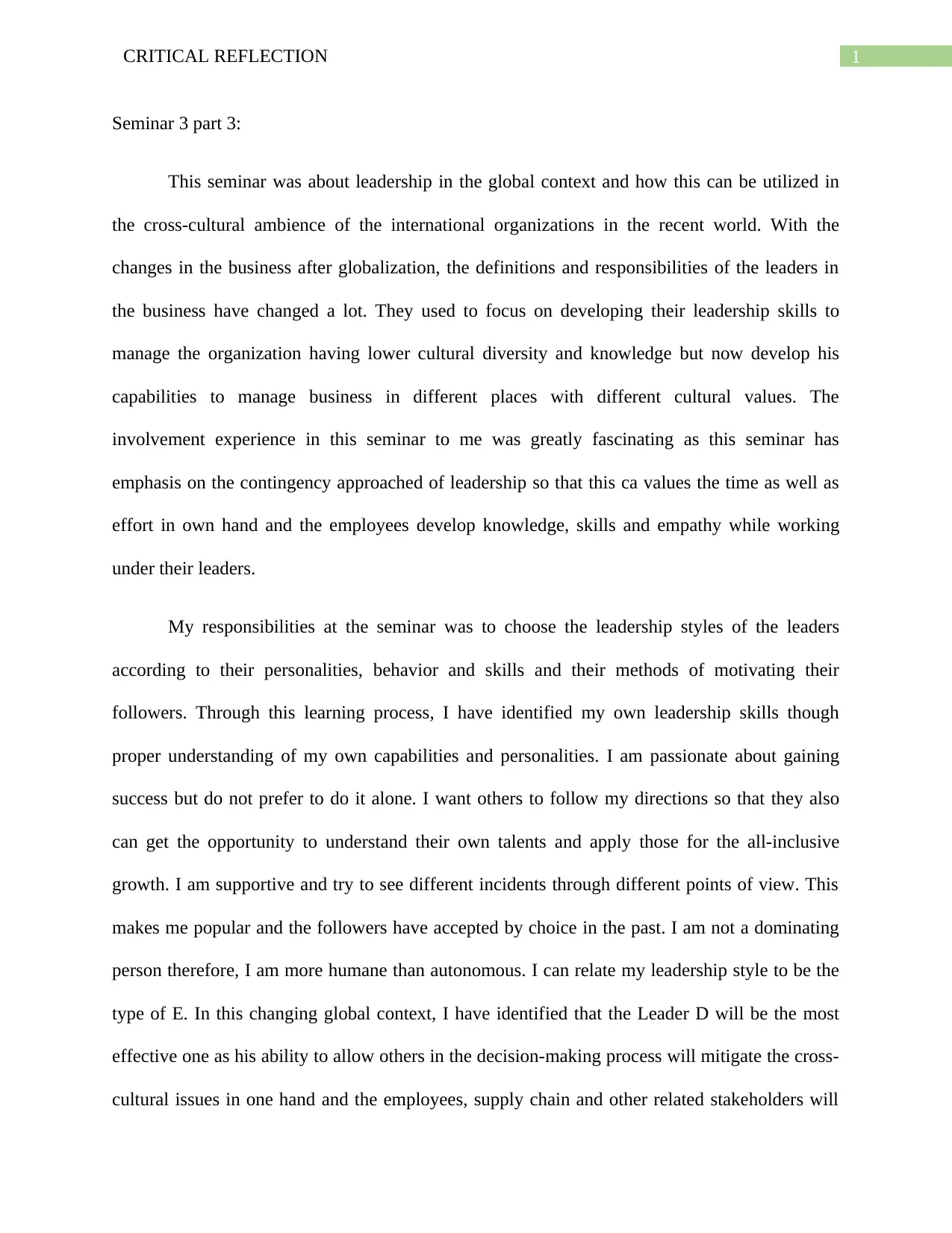
1CRITICAL REFLECTION
Seminar 3 part 3:
This seminar was about leadership in the global context and how this can be utilized in
the cross-cultural ambience of the international organizations in the recent world. With the
changes in the business after globalization, the definitions and responsibilities of the leaders in
the business have changed a lot. They used to focus on developing their leadership skills to
manage the organization having lower cultural diversity and knowledge but now develop his
capabilities to manage business in different places with different cultural values. The
involvement experience in this seminar to me was greatly fascinating as this seminar has
emphasis on the contingency approached of leadership so that this ca values the time as well as
effort in own hand and the employees develop knowledge, skills and empathy while working
under their leaders.
My responsibilities at the seminar was to choose the leadership styles of the leaders
according to their personalities, behavior and skills and their methods of motivating their
followers. Through this learning process, I have identified my own leadership skills though
proper understanding of my own capabilities and personalities. I am passionate about gaining
success but do not prefer to do it alone. I want others to follow my directions so that they also
can get the opportunity to understand their own talents and apply those for the all-inclusive
growth. I am supportive and try to see different incidents through different points of view. This
makes me popular and the followers have accepted by choice in the past. I am not a dominating
person therefore, I am more humane than autonomous. I can relate my leadership style to be the
type of E. In this changing global context, I have identified that the Leader D will be the most
effective one as his ability to allow others in the decision-making process will mitigate the cross-
cultural issues in one hand and the employees, supply chain and other related stakeholders will
Seminar 3 part 3:
This seminar was about leadership in the global context and how this can be utilized in
the cross-cultural ambience of the international organizations in the recent world. With the
changes in the business after globalization, the definitions and responsibilities of the leaders in
the business have changed a lot. They used to focus on developing their leadership skills to
manage the organization having lower cultural diversity and knowledge but now develop his
capabilities to manage business in different places with different cultural values. The
involvement experience in this seminar to me was greatly fascinating as this seminar has
emphasis on the contingency approached of leadership so that this ca values the time as well as
effort in own hand and the employees develop knowledge, skills and empathy while working
under their leaders.
My responsibilities at the seminar was to choose the leadership styles of the leaders
according to their personalities, behavior and skills and their methods of motivating their
followers. Through this learning process, I have identified my own leadership skills though
proper understanding of my own capabilities and personalities. I am passionate about gaining
success but do not prefer to do it alone. I want others to follow my directions so that they also
can get the opportunity to understand their own talents and apply those for the all-inclusive
growth. I am supportive and try to see different incidents through different points of view. This
makes me popular and the followers have accepted by choice in the past. I am not a dominating
person therefore, I am more humane than autonomous. I can relate my leadership style to be the
type of E. In this changing global context, I have identified that the Leader D will be the most
effective one as his ability to allow others in the decision-making process will mitigate the cross-
cultural issues in one hand and the employees, supply chain and other related stakeholders will
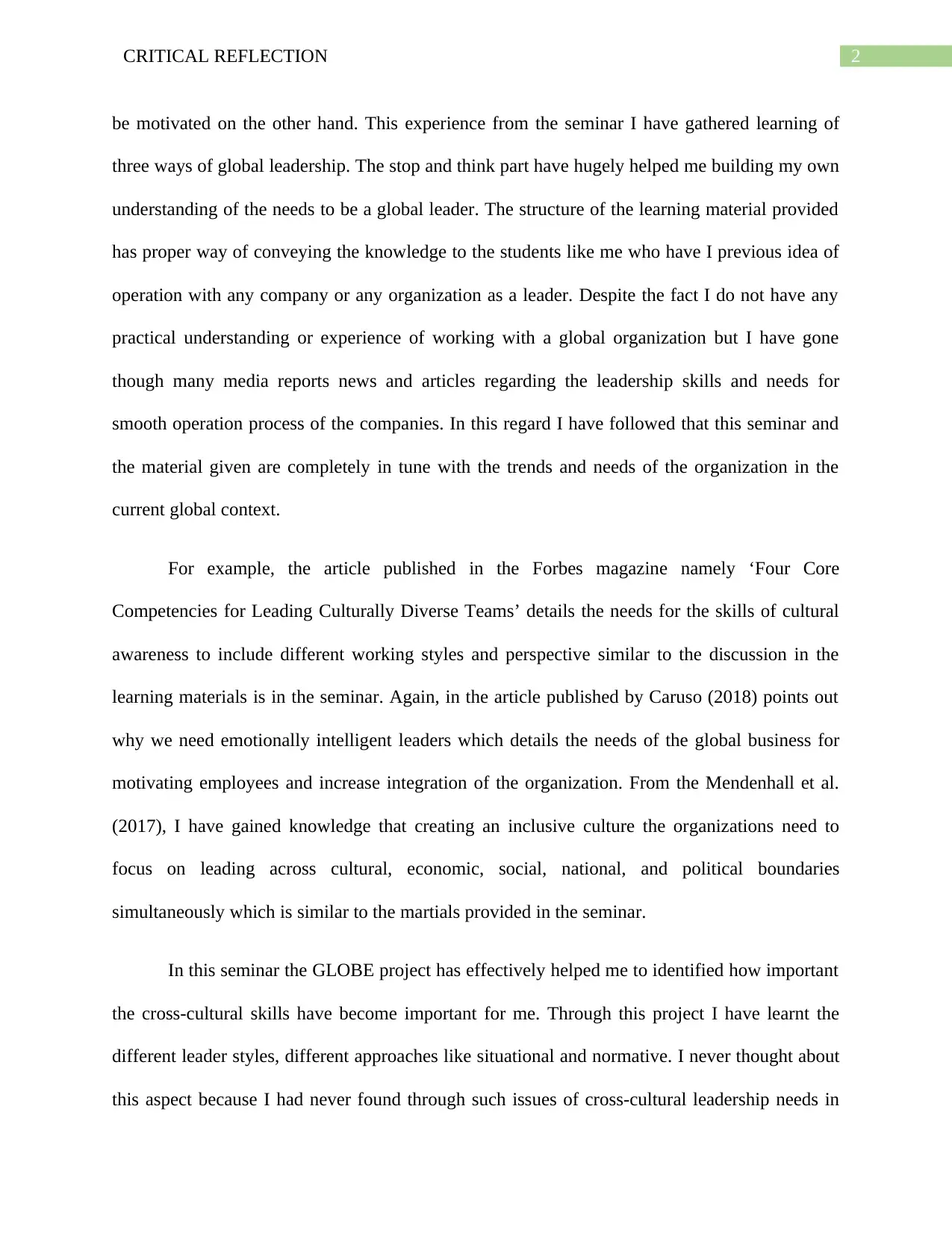
2CRITICAL REFLECTION
be motivated on the other hand. This experience from the seminar I have gathered learning of
three ways of global leadership. The stop and think part have hugely helped me building my own
understanding of the needs to be a global leader. The structure of the learning material provided
has proper way of conveying the knowledge to the students like me who have I previous idea of
operation with any company or any organization as a leader. Despite the fact I do not have any
practical understanding or experience of working with a global organization but I have gone
though many media reports news and articles regarding the leadership skills and needs for
smooth operation process of the companies. In this regard I have followed that this seminar and
the material given are completely in tune with the trends and needs of the organization in the
current global context.
For example, the article published in the Forbes magazine namely ‘Four Core
Competencies for Leading Culturally Diverse Teams’ details the needs for the skills of cultural
awareness to include different working styles and perspective similar to the discussion in the
learning materials is in the seminar. Again, in the article published by Caruso (2018) points out
why we need emotionally intelligent leaders which details the needs of the global business for
motivating employees and increase integration of the organization. From the Mendenhall et al.
(2017), I have gained knowledge that creating an inclusive culture the organizations need to
focus on leading across cultural, economic, social, national, and political boundaries
simultaneously which is similar to the martials provided in the seminar.
In this seminar the GLOBE project has effectively helped me to identified how important
the cross-cultural skills have become important for me. Through this project I have learnt the
different leader styles, different approaches like situational and normative. I never thought about
this aspect because I had never found through such issues of cross-cultural leadership needs in
be motivated on the other hand. This experience from the seminar I have gathered learning of
three ways of global leadership. The stop and think part have hugely helped me building my own
understanding of the needs to be a global leader. The structure of the learning material provided
has proper way of conveying the knowledge to the students like me who have I previous idea of
operation with any company or any organization as a leader. Despite the fact I do not have any
practical understanding or experience of working with a global organization but I have gone
though many media reports news and articles regarding the leadership skills and needs for
smooth operation process of the companies. In this regard I have followed that this seminar and
the material given are completely in tune with the trends and needs of the organization in the
current global context.
For example, the article published in the Forbes magazine namely ‘Four Core
Competencies for Leading Culturally Diverse Teams’ details the needs for the skills of cultural
awareness to include different working styles and perspective similar to the discussion in the
learning materials is in the seminar. Again, in the article published by Caruso (2018) points out
why we need emotionally intelligent leaders which details the needs of the global business for
motivating employees and increase integration of the organization. From the Mendenhall et al.
(2017), I have gained knowledge that creating an inclusive culture the organizations need to
focus on leading across cultural, economic, social, national, and political boundaries
simultaneously which is similar to the martials provided in the seminar.
In this seminar the GLOBE project has effectively helped me to identified how important
the cross-cultural skills have become important for me. Through this project I have learnt the
different leader styles, different approaches like situational and normative. I never thought about
this aspect because I had never found through such issues of cross-cultural leadership needs in
⊘ This is a preview!⊘
Do you want full access?
Subscribe today to unlock all pages.

Trusted by 1+ million students worldwide
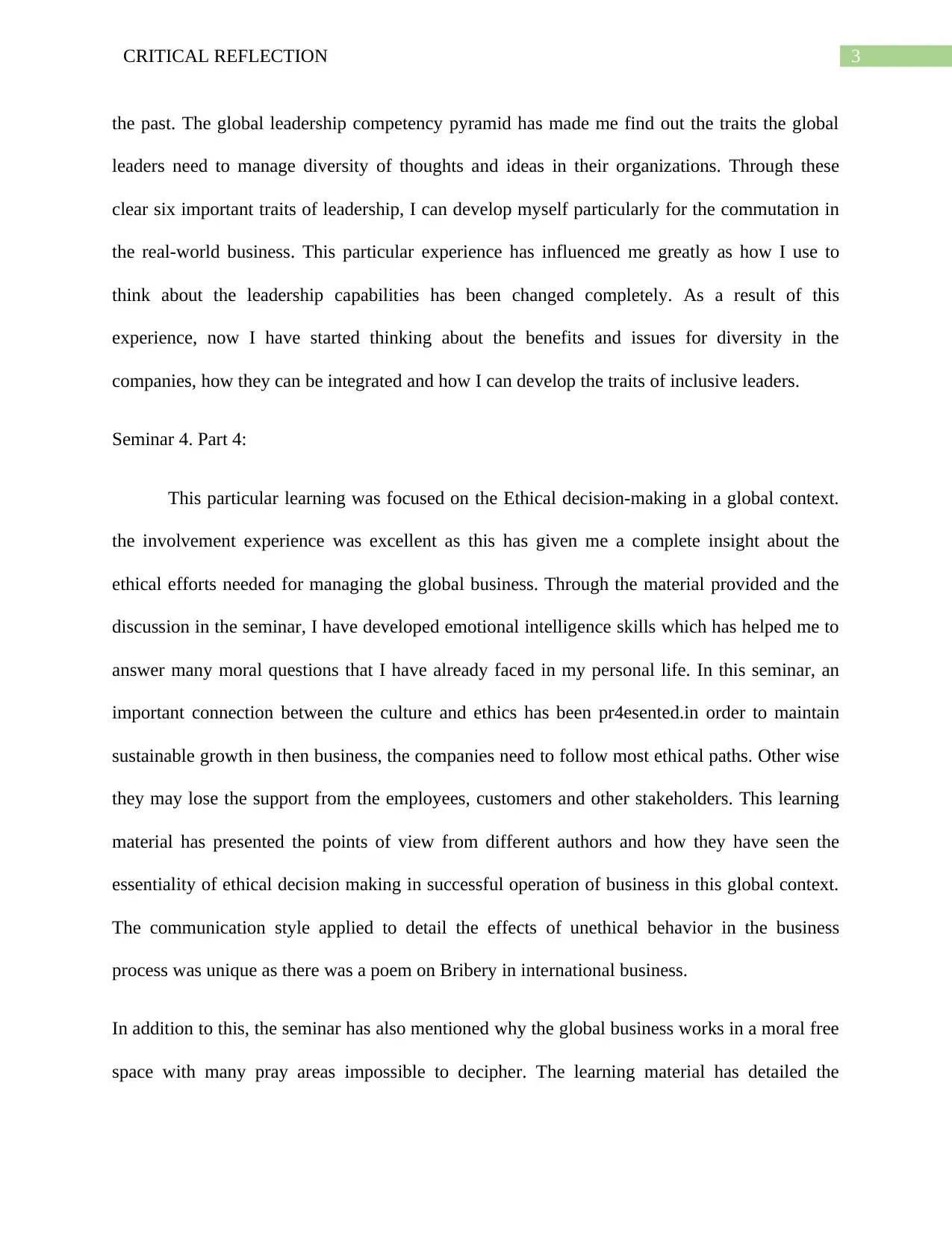
3CRITICAL REFLECTION
the past. The global leadership competency pyramid has made me find out the traits the global
leaders need to manage diversity of thoughts and ideas in their organizations. Through these
clear six important traits of leadership, I can develop myself particularly for the commutation in
the real-world business. This particular experience has influenced me greatly as how I use to
think about the leadership capabilities has been changed completely. As a result of this
experience, now I have started thinking about the benefits and issues for diversity in the
companies, how they can be integrated and how I can develop the traits of inclusive leaders.
Seminar 4. Part 4:
This particular learning was focused on the Ethical decision-making in a global context.
the involvement experience was excellent as this has given me a complete insight about the
ethical efforts needed for managing the global business. Through the material provided and the
discussion in the seminar, I have developed emotional intelligence skills which has helped me to
answer many moral questions that I have already faced in my personal life. In this seminar, an
important connection between the culture and ethics has been pr4esented.in order to maintain
sustainable growth in then business, the companies need to follow most ethical paths. Other wise
they may lose the support from the employees, customers and other stakeholders. This learning
material has presented the points of view from different authors and how they have seen the
essentiality of ethical decision making in successful operation of business in this global context.
The communication style applied to detail the effects of unethical behavior in the business
process was unique as there was a poem on Bribery in international business.
In addition to this, the seminar has also mentioned why the global business works in a moral free
space with many pray areas impossible to decipher. The learning material has detailed the
the past. The global leadership competency pyramid has made me find out the traits the global
leaders need to manage diversity of thoughts and ideas in their organizations. Through these
clear six important traits of leadership, I can develop myself particularly for the commutation in
the real-world business. This particular experience has influenced me greatly as how I use to
think about the leadership capabilities has been changed completely. As a result of this
experience, now I have started thinking about the benefits and issues for diversity in the
companies, how they can be integrated and how I can develop the traits of inclusive leaders.
Seminar 4. Part 4:
This particular learning was focused on the Ethical decision-making in a global context.
the involvement experience was excellent as this has given me a complete insight about the
ethical efforts needed for managing the global business. Through the material provided and the
discussion in the seminar, I have developed emotional intelligence skills which has helped me to
answer many moral questions that I have already faced in my personal life. In this seminar, an
important connection between the culture and ethics has been pr4esented.in order to maintain
sustainable growth in then business, the companies need to follow most ethical paths. Other wise
they may lose the support from the employees, customers and other stakeholders. This learning
material has presented the points of view from different authors and how they have seen the
essentiality of ethical decision making in successful operation of business in this global context.
The communication style applied to detail the effects of unethical behavior in the business
process was unique as there was a poem on Bribery in international business.
In addition to this, the seminar has also mentioned why the global business works in a moral free
space with many pray areas impossible to decipher. The learning material has detailed the
Paraphrase This Document
Need a fresh take? Get an instant paraphrase of this document with our AI Paraphraser
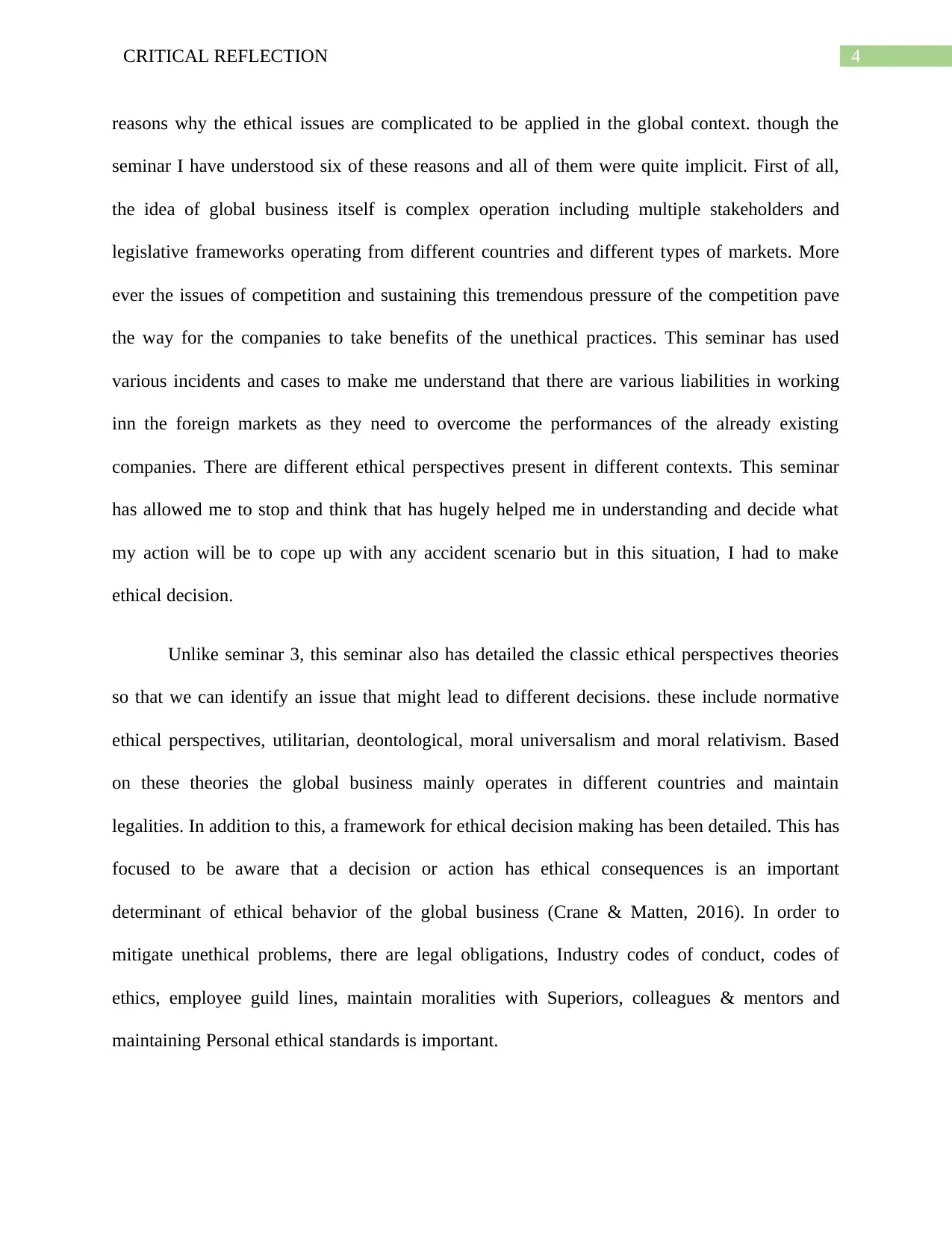
4CRITICAL REFLECTION
reasons why the ethical issues are complicated to be applied in the global context. though the
seminar I have understood six of these reasons and all of them were quite implicit. First of all,
the idea of global business itself is complex operation including multiple stakeholders and
legislative frameworks operating from different countries and different types of markets. More
ever the issues of competition and sustaining this tremendous pressure of the competition pave
the way for the companies to take benefits of the unethical practices. This seminar has used
various incidents and cases to make me understand that there are various liabilities in working
inn the foreign markets as they need to overcome the performances of the already existing
companies. There are different ethical perspectives present in different contexts. This seminar
has allowed me to stop and think that has hugely helped me in understanding and decide what
my action will be to cope up with any accident scenario but in this situation, I had to make
ethical decision.
Unlike seminar 3, this seminar also has detailed the classic ethical perspectives theories
so that we can identify an issue that might lead to different decisions. these include normative
ethical perspectives, utilitarian, deontological, moral universalism and moral relativism. Based
on these theories the global business mainly operates in different countries and maintain
legalities. In addition to this, a framework for ethical decision making has been detailed. This has
focused to be aware that a decision or action has ethical consequences is an important
determinant of ethical behavior of the global business (Crane & Matten, 2016). In order to
mitigate unethical problems, there are legal obligations, Industry codes of conduct, codes of
ethics, employee guild lines, maintain moralities with Superiors, colleagues & mentors and
maintaining Personal ethical standards is important.
reasons why the ethical issues are complicated to be applied in the global context. though the
seminar I have understood six of these reasons and all of them were quite implicit. First of all,
the idea of global business itself is complex operation including multiple stakeholders and
legislative frameworks operating from different countries and different types of markets. More
ever the issues of competition and sustaining this tremendous pressure of the competition pave
the way for the companies to take benefits of the unethical practices. This seminar has used
various incidents and cases to make me understand that there are various liabilities in working
inn the foreign markets as they need to overcome the performances of the already existing
companies. There are different ethical perspectives present in different contexts. This seminar
has allowed me to stop and think that has hugely helped me in understanding and decide what
my action will be to cope up with any accident scenario but in this situation, I had to make
ethical decision.
Unlike seminar 3, this seminar also has detailed the classic ethical perspectives theories
so that we can identify an issue that might lead to different decisions. these include normative
ethical perspectives, utilitarian, deontological, moral universalism and moral relativism. Based
on these theories the global business mainly operates in different countries and maintain
legalities. In addition to this, a framework for ethical decision making has been detailed. This has
focused to be aware that a decision or action has ethical consequences is an important
determinant of ethical behavior of the global business (Crane & Matten, 2016). In order to
mitigate unethical problems, there are legal obligations, Industry codes of conduct, codes of
ethics, employee guild lines, maintain moralities with Superiors, colleagues & mentors and
maintaining Personal ethical standards is important.
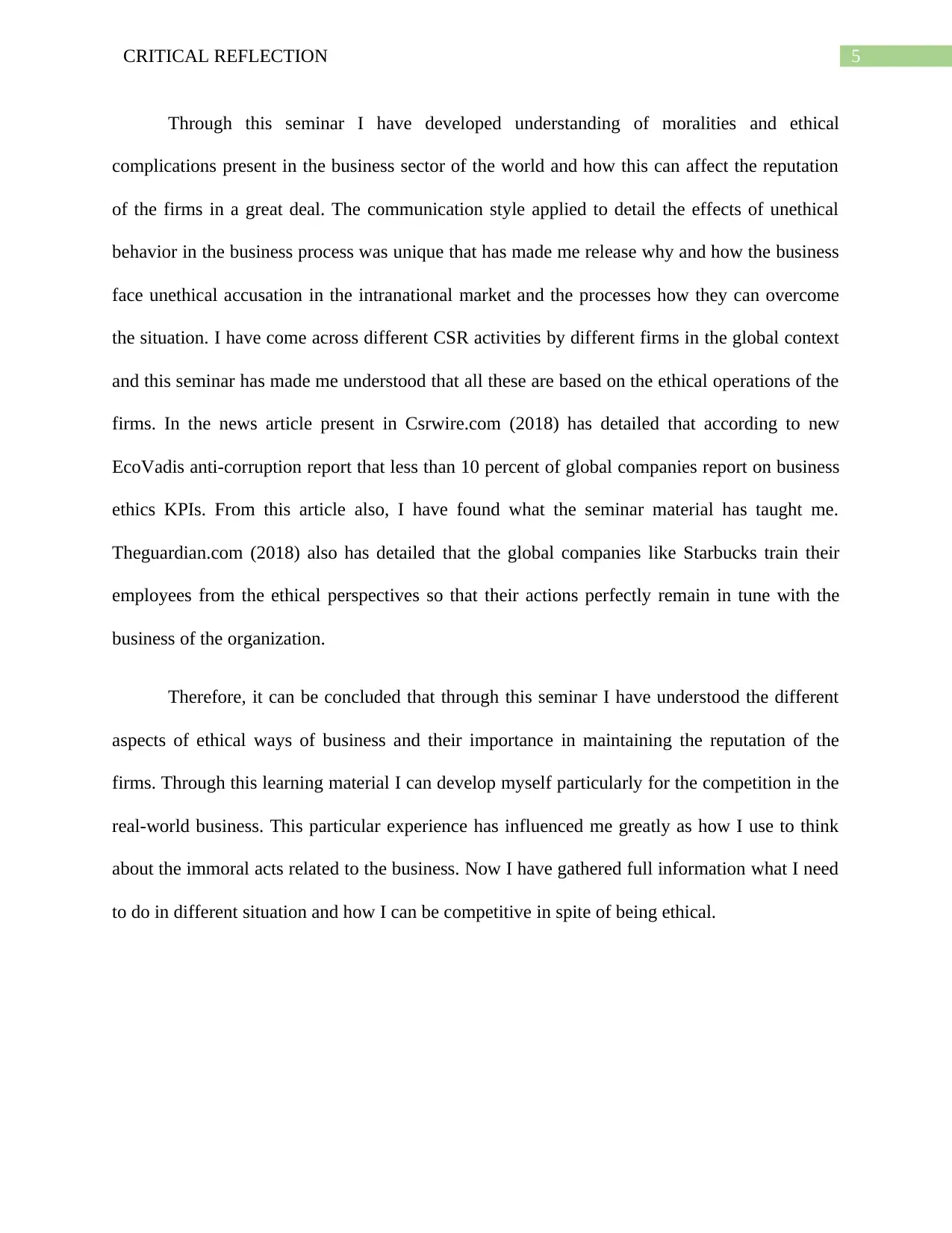
5CRITICAL REFLECTION
Through this seminar I have developed understanding of moralities and ethical
complications present in the business sector of the world and how this can affect the reputation
of the firms in a great deal. The communication style applied to detail the effects of unethical
behavior in the business process was unique that has made me release why and how the business
face unethical accusation in the intranational market and the processes how they can overcome
the situation. I have come across different CSR activities by different firms in the global context
and this seminar has made me understood that all these are based on the ethical operations of the
firms. In the news article present in Csrwire.com (2018) has detailed that according to new
EcoVadis anti-corruption report that less than 10 percent of global companies report on business
ethics KPIs. From this article also, I have found what the seminar material has taught me.
Theguardian.com (2018) also has detailed that the global companies like Starbucks train their
employees from the ethical perspectives so that their actions perfectly remain in tune with the
business of the organization.
Therefore, it can be concluded that through this seminar I have understood the different
aspects of ethical ways of business and their importance in maintaining the reputation of the
firms. Through this learning material I can develop myself particularly for the competition in the
real-world business. This particular experience has influenced me greatly as how I use to think
about the immoral acts related to the business. Now I have gathered full information what I need
to do in different situation and how I can be competitive in spite of being ethical.
Through this seminar I have developed understanding of moralities and ethical
complications present in the business sector of the world and how this can affect the reputation
of the firms in a great deal. The communication style applied to detail the effects of unethical
behavior in the business process was unique that has made me release why and how the business
face unethical accusation in the intranational market and the processes how they can overcome
the situation. I have come across different CSR activities by different firms in the global context
and this seminar has made me understood that all these are based on the ethical operations of the
firms. In the news article present in Csrwire.com (2018) has detailed that according to new
EcoVadis anti-corruption report that less than 10 percent of global companies report on business
ethics KPIs. From this article also, I have found what the seminar material has taught me.
Theguardian.com (2018) also has detailed that the global companies like Starbucks train their
employees from the ethical perspectives so that their actions perfectly remain in tune with the
business of the organization.
Therefore, it can be concluded that through this seminar I have understood the different
aspects of ethical ways of business and their importance in maintaining the reputation of the
firms. Through this learning material I can develop myself particularly for the competition in the
real-world business. This particular experience has influenced me greatly as how I use to think
about the immoral acts related to the business. Now I have gathered full information what I need
to do in different situation and how I can be competitive in spite of being ethical.
⊘ This is a preview!⊘
Do you want full access?
Subscribe today to unlock all pages.

Trusted by 1+ million students worldwide
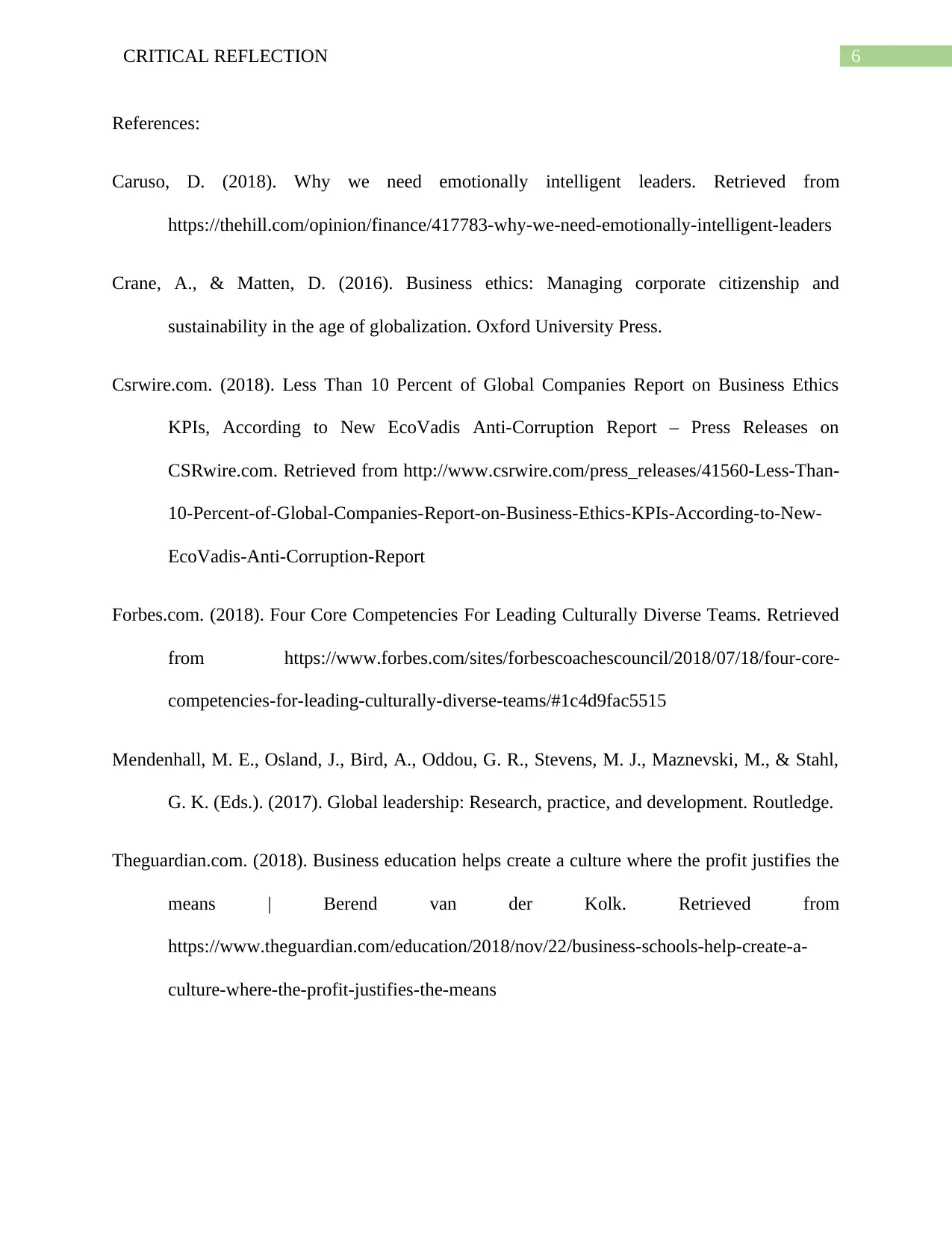
6CRITICAL REFLECTION
References:
Caruso, D. (2018). Why we need emotionally intelligent leaders. Retrieved from
https://thehill.com/opinion/finance/417783-why-we-need-emotionally-intelligent-leaders
Crane, A., & Matten, D. (2016). Business ethics: Managing corporate citizenship and
sustainability in the age of globalization. Oxford University Press.
Csrwire.com. (2018). Less Than 10 Percent of Global Companies Report on Business Ethics
KPIs, According to New EcoVadis Anti-Corruption Report – Press Releases on
CSRwire.com. Retrieved from http://www.csrwire.com/press_releases/41560-Less-Than-
10-Percent-of-Global-Companies-Report-on-Business-Ethics-KPIs-According-to-New-
EcoVadis-Anti-Corruption-Report
Forbes.com. (2018). Four Core Competencies For Leading Culturally Diverse Teams. Retrieved
from https://www.forbes.com/sites/forbescoachescouncil/2018/07/18/four-core-
competencies-for-leading-culturally-diverse-teams/#1c4d9fac5515
Mendenhall, M. E., Osland, J., Bird, A., Oddou, G. R., Stevens, M. J., Maznevski, M., & Stahl,
G. K. (Eds.). (2017). Global leadership: Research, practice, and development. Routledge.
Theguardian.com. (2018). Business education helps create a culture where the profit justifies the
means | Berend van der Kolk. Retrieved from
https://www.theguardian.com/education/2018/nov/22/business-schools-help-create-a-
culture-where-the-profit-justifies-the-means
References:
Caruso, D. (2018). Why we need emotionally intelligent leaders. Retrieved from
https://thehill.com/opinion/finance/417783-why-we-need-emotionally-intelligent-leaders
Crane, A., & Matten, D. (2016). Business ethics: Managing corporate citizenship and
sustainability in the age of globalization. Oxford University Press.
Csrwire.com. (2018). Less Than 10 Percent of Global Companies Report on Business Ethics
KPIs, According to New EcoVadis Anti-Corruption Report – Press Releases on
CSRwire.com. Retrieved from http://www.csrwire.com/press_releases/41560-Less-Than-
10-Percent-of-Global-Companies-Report-on-Business-Ethics-KPIs-According-to-New-
EcoVadis-Anti-Corruption-Report
Forbes.com. (2018). Four Core Competencies For Leading Culturally Diverse Teams. Retrieved
from https://www.forbes.com/sites/forbescoachescouncil/2018/07/18/four-core-
competencies-for-leading-culturally-diverse-teams/#1c4d9fac5515
Mendenhall, M. E., Osland, J., Bird, A., Oddou, G. R., Stevens, M. J., Maznevski, M., & Stahl,
G. K. (Eds.). (2017). Global leadership: Research, practice, and development. Routledge.
Theguardian.com. (2018). Business education helps create a culture where the profit justifies the
means | Berend van der Kolk. Retrieved from
https://www.theguardian.com/education/2018/nov/22/business-schools-help-create-a-
culture-where-the-profit-justifies-the-means
1 out of 7
Related Documents
Your All-in-One AI-Powered Toolkit for Academic Success.
+13062052269
info@desklib.com
Available 24*7 on WhatsApp / Email
![[object Object]](/_next/static/media/star-bottom.7253800d.svg)
Unlock your academic potential
Copyright © 2020–2025 A2Z Services. All Rights Reserved. Developed and managed by ZUCOL.




